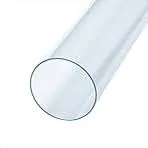stu . 13, 2024 12:56 Back to list
hdpe irrigation pipe
The Advantages of HDPE Irrigation Pipes A Sustainable Solution for Modern Agriculture
In the ever-evolving world of agriculture, the quest for sustainable and efficient irrigation methods has never been more critical. One of the most significant advancements in this realm is the use of High-Density Polyethylene (HDPE) pipes for irrigation systems. These pipes have gained immense popularity due to their durability, flexibility, and resistance to various environmental factors, making them an ideal choice for modern farming practices. In this article, we will explore the advantages of HDPE irrigation pipes and why they have become a preferred option for farmers worldwide.
1. Durability and Longevity
HDPE irrigation pipes are renowned for their durability. Unlike traditional materials such as metal or clay, HDPE is resistant to corrosion, rust, and chemical degradation. This means that HDPE pipes can withstand harsh environmental conditions, including extreme temperatures, ultraviolet (UV) radiation, and exposure to various chemicals commonly found in fertilizers and pesticides. Moreover, the life expectancy of HDPE pipes can exceed 50 years, ensuring that farmers will not frequently incur replacement costs, thus providing a solid return on investment over time.
2. Flexibility and Ease of Installation
Another major advantage of HDPE pipes is their flexibility. This characteristic allows them to bend and contour around obstacles, making them easier to install in varied terrains without the need for complex fittings or joints. Farmers can lay these pipes over long distances with minimal effort, significantly reducing installation time and labor costs. The lightweight nature of HDPE pipes also simplifies transportation and handling, enabling farmers to set up their irrigation systems swiftly and efficiently.
3
. Efficiency in Water ManagementWater scarcity is a pressing concern in agriculture, necessitating effective water management strategies. HDPE irrigation pipes facilitate efficient water transportation through their smooth inner surfaces, which minimize friction losses. This design allows for a consistent flow of water, ensuring that crops receive adequate hydration without waste. Furthermore, HDPE pipes can be integrated into various irrigation systems, including drip, sprinkler, and surface irrigation, providing flexibility to meet the specific needs of different crops and soil types.
hdpe irrigation pipe

4. Reduced Environmental Impact
As environmental awareness continues to grow, the agricultural sector is increasingly focused on sustainable practices. HDPE pipes contribute to this goal by enabling precision irrigation techniques that reduce water consumption. By preventing leaks and excessively distributing water to crops, HDPE systems conserve water resources and promote responsible agriculture. Additionally, HDPE is a recyclable material, which aligns with the principles of sustainable farming. When the pipes reach the end of their life cycle, they can be repurposed, reducing waste and promoting a circular economy.
5. Cost-Effectiveness
The financial implications of adopting HDPE irrigation pipes can be substantial. Although the initial investment may be higher than traditional irrigation systems, the long-term savings associated with reduced maintenance, lower replacement frequency, and water conservation make them a cost-effective option for farmers. The efficiency of water usage can also lead to better crop yields, further enhancing profitability. Furthermore, with the rising focus on sustainable practices, utilizing HDPE pipes may also offer access to grants or incentives for adopting environmentally friendly technologies.
6. Compatibility with Technology
The advancement of technology in agriculture has introduced various innovative tools, such as automated irrigation systems and moisture sensors. HDPE pipes can easily integrate with these technologies, enabling farmers to optimize their irrigation schedules based on real-time data. This synergy enhances the efficiency of water usage and promotes better crop management, ultimately leading to higher yields and reduced labor costs.
Conclusion
As the agricultural sector continues to face challenges related to water scarcity, climate change, and the need for sustainable practices, HDPE irrigation pipes present a compelling solution. Their durability, flexibility, efficiency in water management, and environmental benefits make them a revolutionary choice for modern agriculture. By investing in HDPE pipes, farmers can ensure the sustainability of their practices while maximizing crop production, making this technology a pivotal component of the future of agriculture. Embracing HDPE irrigation systems is not just a choice; it is a step towards a more sustainable and productive agricultural landscape.
-
Durable PP Rigid Sheet: Lightweight, Chemical Resistant Solutions
NewsAug.21,2025
-
PVC Grey Sheet for Extraction: Chemical Resistant & Durable
NewsAug.19,2025
-
Durable PVC Pipe Fittings for Plumbing & Irrigation Needs
NewsAug.18,2025
-
HDPE Steel Belt Reinforced Spiral Corrugated Pipe | High Strength
NewsAug.17,2025
-
HDPE Pipe Fittings: Durable, Leak-Proof Solutions
NewsAug.16,2025
-
Premium CPVC Sheet: High-Temp & Chemical Resistant Solutions
NewsAug.15,2025

